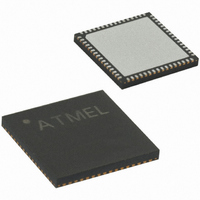ATMEGA256RZAV-8MU Atmel, ATMEGA256RZAV-8MU Datasheet - Page 17

ATMEGA256RZAV-8MU
Manufacturer Part Number
ATMEGA256RZAV-8MU
Description
MCU ATMEGA2561/AT86RF230 64-QFN
Manufacturer
Atmel
Series
ATMEGAr
Datasheets
1.ATMEGA640V-8CU.pdf
(38 pages)
2.ATMEGA640V-8CU.pdf
(444 pages)
3.AT86RF230-ZU.pdf
(98 pages)
Specifications of ATMEGA256RZAV-8MU
Frequency
2.4GHz
Modulation Or Protocol
802.15.4 Zigbee
Applications
ISM, ZigBee™
Power - Output
3dBm
Sensitivity
-101dBm
Voltage - Supply
1.8 V ~ 3.6 V
Current - Receiving
15.5mA
Current - Transmitting
16.5mA
Data Interface
PCB, Surface Mount
Memory Size
256kB Flash, 4kB EEPROM, 8kB RAM
Antenna Connector
PCB, Surface Mount
Package / Case
64-QFN
Wireless Frequency
2.4 GHz
Interface Type
JTAG, SPI
Output Power
3 dBm
For Use With
ATAVRISP2 - PROGRAMMER AVR IN SYSTEMATJTAGICE2 - AVR ON-CHIP D-BUG SYSTEM
Lead Free Status / RoHS Status
Lead free / RoHS Compliant
Operating Temperature
-
Data Rate - Maximum
-
Lead Free Status / Rohs Status
Lead free / RoHS Compliant
For Use With/related Products
ATmega256
Available stocks
Company
Part Number
Manufacturer
Quantity
Price
Company:
Part Number:
ATMEGA256RZAV-8MU
Manufacturer:
Atmel
Quantity:
135
- Current page: 17 of 444
- Download datasheet (10Mb)
6.6.1
6.6.2
6.7
2549M–AVR–09/10
Instruction Execution Timing
RAMPZ – Extended Z-pointer Register for ELPM/SPM
EIND – Extended Indirect Register
For ELPM/SPM instructions, the Z-pointer is a concatenation of RAMPZ, ZH, and ZL, as shown
in Figure 6-4. Note that LPM is not affected by the RAMPZ setting.
Figure 6-4.
The actual number of bits is implementation dependent. Unused bits in an implementation will
always read as zero. For compatibility with future devices, be sure to write these bits to zero.
For EICALL/EIJMP instructions, the Indirect-pointer to the subroutine/routine is a concatenation
of EIND, ZH, and ZL, as shown in Figure 6-5. Note that ICALL and IJMP are not affected by the
EIND setting.
Figure 6-5.
The actual number of bits is implementation dependent. Unused bits in an implementation will
always read as zero. For compatibility with future devices, be sure to write these bits to zero.
This section describes the general access timing concepts for instruction execution. The AVR
CPU is driven by the CPU clock clk
chip. No internal clock division is used.
Figure 6-6 on page 18
by the Harvard architecture and the fast-access Register File concept. This is the basic pipelin-
ing concept to obtain up to 1 MIPS per MHz with the corresponding unique results for functions
per cost, functions per clocks, and functions per power-unit.
Bit
0x3B (0x5B)
Read/Write
Initial Value
Bit (
Individually)
Bit (Z-pointer)
Bit
0x3C (0x5C)
Read/Write
Initial Value
Bit (Individual-
ly)
Bit
pointer)
(Indirect-
RAMPZ7
EIND7
The Z-pointer used by ELPM and SPM
The Indirect-pointer used by EICALL and EIJMP
R/W
R/W
7
0
7
0
23
23
7
7
RAMPZ6
EIND6
shows the parallel instruction fetches and instruction executions enabled
R/W
R/W
EIND
RAMPZ
6
0
6
0
RAMPZ5
EIND5
R/W
R/W
ATmega640/1280/1281/2560/2561
16
5
0
5
0
0
16
0
CPU
, directly generated from the selected clock source for the
RAMPZ4
EIND4
R/W
R/W
4
0
4
0
15
7
15
7
RAMPZ3
EIND3
R/W
R/W
ZH
3
0
3
0
ZH
RAMPZ2
EIND2
R/W
R/W
2
0
2
0
0
8
0
8
RAMPZ1
EIND1
R/W
R/W
1
0
1
0
7
7
7
7
RAMPZ0
EIND0
R/W
R/W
ZL
0
0
0
0
ZL
RAMPZ
EIND
0
0
0
0
17
Related parts for ATMEGA256RZAV-8MU
Image
Part Number
Description
Manufacturer
Datasheet
Request
R

Part Number:
Description:
DEV KIT FOR AVR/AVR32
Manufacturer:
Atmel
Datasheet:

Part Number:
Description:
INTERVAL AND WIPE/WASH WIPER CONTROL IC WITH DELAY
Manufacturer:
ATMEL Corporation
Datasheet:

Part Number:
Description:
Low-Voltage Voice-Switched IC for Hands-Free Operation
Manufacturer:
ATMEL Corporation
Datasheet:

Part Number:
Description:
MONOLITHIC INTEGRATED FEATUREPHONE CIRCUIT
Manufacturer:
ATMEL Corporation
Datasheet:

Part Number:
Description:
AM-FM Receiver IC U4255BM-M
Manufacturer:
ATMEL Corporation
Datasheet:

Part Number:
Description:
Monolithic Integrated Feature Phone Circuit
Manufacturer:
ATMEL Corporation
Datasheet:

Part Number:
Description:
Multistandard Video-IF and Quasi Parallel Sound Processing
Manufacturer:
ATMEL Corporation
Datasheet:

Part Number:
Description:
High-performance EE PLD
Manufacturer:
ATMEL Corporation
Datasheet:

Part Number:
Description:
8-bit Flash Microcontroller
Manufacturer:
ATMEL Corporation
Datasheet:

Part Number:
Description:
2-Wire Serial EEPROM
Manufacturer:
ATMEL Corporation
Datasheet:











